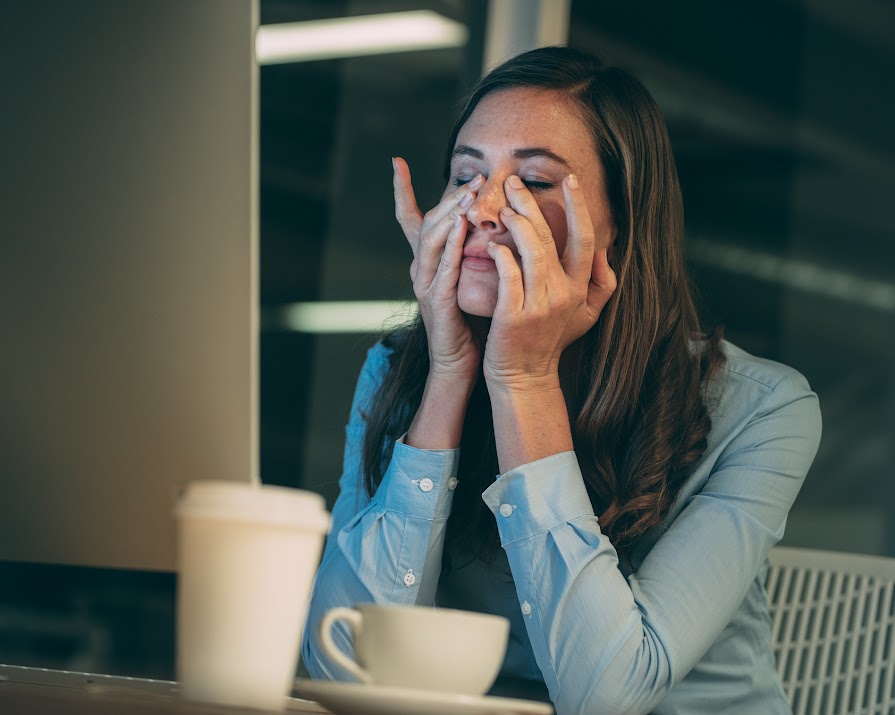
By Erin Lindsay
27th Oct 2020
27th Oct 2020
Anxiety is one of the most commonly diagnosed mental health problems in Ireland — but those with high-functioning anxiety sometimes may not even be aware that they have it
Around 1 in 6 people will experience a mental health problem at some point in their life — with anxiety being one of the most prevalent. There are many different forms of anxiety, that can be triggered by a number of factors. But one particular form of the problem can be more difficult than most to figure out and overcome.
High-functioning anxiety is not a medically-recognised condition — rather, it’s a term to describe a particular type of anxiety, and a particular method of dealing with the problem.
To delve deeper into what high-functioning anxiety really means — the signs, symptoms, characteristics, and treatments available — IMAGE spoke to Michael Leddin, accredited psychotherapist and clinical manager of Anxiety Ireland, to find out more about this increasingly common condition.
How would you define ‘high functioning anxiety’?
“From our point of view, high functioning anxiety would be anxiety that exists and can cause suffering in a person but that doesn’t fit your typical image of someone who’s struggling with anxiety. They’re not falling apart; they’re still doing everything that they’re supposed to be doing. But it’s at a cost to themselves.
The symptoms can be a little bit hidden, and maybe they’re not even known to the person themselves. High-functioning anxiety can crop up in relationships and work, in peer groups, or even in relation to things like social media.
What are some of the symptoms that are unique to high-functioning anxiety?
With high-functioning anxiety, there can be both a positive side and a negative side to the problem. In terms of stress, you can have good stress and bad stress. You can have distress, which is when something’s gone wrong and you’re not happy or you’re being provoked. But a certain level of stress can be good, where it pushes you to work hard, like when you might have an exam coming up.
When it comes to high-functioning anxiety, it’s the same. The positive effects could be that the person is very driven; very successful; very punctual; always on time; really good attention to detail. It’s the type of person who is really on their game and pushing the boat out to be better and to succeed.
But when someone has this type of anxiety from a need to succeed, they may procrastinate. A lot of procrastinators are really capable but they put so much pressure on themselves that they say “what’s the point? I could never do this, so I might as well give up before starting” — whereas they’re actually very capable of doing it.
Someone with high-functioning anxiety can be self deprecating; have low self-esteem; they overthink and over-plan, and may even find that they get on other people’s nerves about how they need to hold themselves to a certain standard. They may find it hard to say no, and take on the responsibility of everything themselves.
Is it sometimes the case that someone with high-functioning anxiety may not even be aware of the problem, or may be hesitant to address the problem?
Many clients who come to us aren’t aware of the possibility of high-functioning anxiety. They say things like: ‘I’ve got stomach issues and the doctors have ruled out physical problems; I’ve got a lot of tension and irritability; I’m not sleeping; I’ve started using alcohol or drugs to calm the problem’. They may be shocked to hear that anxiety is the issue.
Many of us make rules for ourselves for the way we adapt to and survive our experiences. Maybe as a child, a person may have learned to take responsibility for their siblings from a young age, or they have learned that they’re only worthwhile when they’re achieving, and feel they can never let others down. We internalise the roles we play from a young age, and that can be hard to let go of. Some people may feel that if they try to remedy their anxiety, they’ll lose a part of their personality or what makes them successful. It’s about trying to push them to loosen their grip.
Is there a certain demographic that you see presenting with high-functioning anxiety more than others?
We see slightly more women coming in than men, but this may be due to more women actually seeking treatment for their anxiety rather than ignoring it. With women, it is generally a 25-55 age group, successful in work, or who have maybe recently become mothers, and are finding themselves under pressure.
We do have men who come in with stresses due to work, who may own their own business and feel pressure to be the breadwinners of the family.
As I mentioned, it’s not unusual for the eldest child of a family to feel anxiety, due to the responsibility they have felt to look after their siblings.
Generally, we see people from all walks of life, from teenagers to pensioners. It just depends what they are struggling with.
At what point should someone seek help or treatment for high-functioning anxiety?
We all have our different thresholds for stress, and there can still be some stigma around going to counselling for some people. It can vary but I always say, with anxiety of any kind, the earlier the better to seek help. If you seek treatment when you first see the signs of a problem, it could be the difference between a few sessions of therapy to give you the tools to frame your thinking differently, or needing much more extensive treatment when things get worse.
If you feel something’s off, if you feel something could be better, it might be worth having a conversation with someone about it. It doesn’t have to go into your whole life history — it can be as simple as checking in and asking ‘how am I coping with things at the moment?’ A lot of workplaces nowadays offer Employee Assistance programmes, they’re always worth checking out, especially if the problem is around work. There are more and more therapy centres opening around the country each week and just taking that time for yourself is worth it.
What are some other ways that people can relieve anxiety at home?
The main thing is trying to get into a good habit of relaxation. Anxiety is emotional, mental and physical, so it puts the body under an awful lot of pressure. For people with high-functioning anxiety, if they can give themselves permission to do nothing and to relax, it can be a huge help.
Getting out for walks, and spending time in nature can be brilliant. A lot of what we do is Cognitive Behavioural Therapy, and it can actually be very similar to meditation and certain types of mindfulness. I would recommend apps like Headspace for someone with anxiety — if they can stick with it, it can be really beneficial.
Try and reduce any over-stimulation — cut down on late-night Googling, especially Googling symptoms, and social media. Try to introduce boundaries — remember that if you say no to somebody, that means you’re saying yes to yourself.
Anxiety Ireland provides information, encouragement and expert psychotherapy to those suffering with anxiety in Ireland. You can find out more information by emailing [email protected]
Read more: What is the best mental health advice you ever received?
Read more: ‘You were expected to be a machine’ — Jodie Kidd talks modelling, mental health and why running a pub is her favourite role yet
Read more: Online harassment and trolling: how to handle cyber-bullying as an adult























